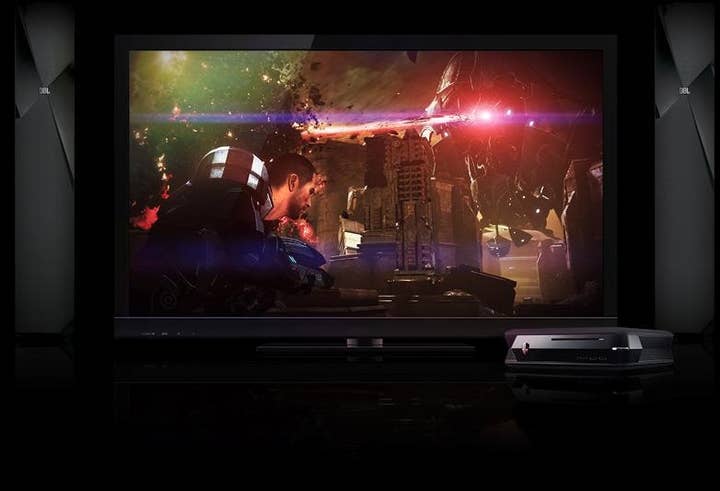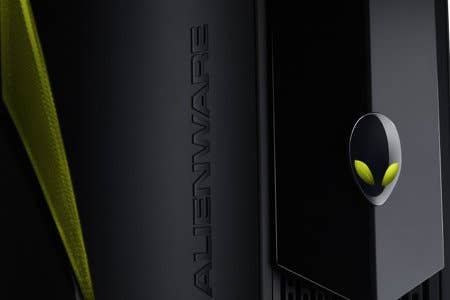Alienware And The Battle For The Living Room
Arthur Lewis on turning PC gaming into a ten-foot experience, and why publishers will leave the console model behind
The rumoured death of PC gaming has haunted Arthur Lewis for much of the last two decades. As one of the principal shareholders and top executives at Alienware, he helped steer a fanciful idea concocted by two of his childhood friends to the very pinnacle of PC gaming hardware, and ultimately to a 2006 acquisition by Dell rumoured to be in the hundreds of millions. But in all that time, and through all that success, the notion that PC gaming was a hair's breadth from some catastrophic tipping point was on every journalist's agenda.
"It has always been a forecast that has never come to fruition," he says, "but PC gaming will never die, because PC gaming drives technology."
Lewis is now vice president of product management for Dell's entire PC division, but he has worked around PC gaming for long enough to witness a persistent stream of innovations that owe their very existence to the growing market for video games.
"Products like SLI and CrossfireX never would have happened if it wasn't for PC gaming, extreme edition processors from Intel never would have happened without gaming, and the list goes on and on and on: high speed memory, video frame-buffer memory on discrete graphics cards.
"All of those things are driven by high-end applications, and there are still very few applications that are as taxing as games. That will continue until, well, as far as I can see. I don't know how far that is, but I don't see the end any time soon."
"Game developers would rather create for one platform, not four platforms, so the more we can make the PC a ubiquitous device the better it is for the industry"
In 2005, speculative articles about the obsolescence of PC gaming could be forgiven, if not entirely respected: there was no Facebook, no Steam, and a highly anticipated console generation rumbling over the horizon. But such an article appearing today, in 2012, is virtually beyond comprehension. PC gaming is a bigger and more diverse marketplace than ever before, readily embracing the sort of progressive technologies and practices that console manufacturers are still struggling to adopt.
"If you take a look at the data from the PC Gaming Alliance, software revenue is gone up," Lewis says. "I think this year will be about $20 billion in PC software sales. The problem is that games are like movies: most are not good, some are great, so there's a high beta. You get a lot of noise when a game doesn't do well, but there are a lot of games that are very successful, and many more games in general.
"Take a look at what Valve has done with Steam - it's incredible. They have 40 million active subscribers, they generate a billion dollars in revenue, and that's going to lead the way into something else; maybe a 10-foot experience, or a different UI. That's innovation driven by gaming."
During our interview, the concept of a "ten-foot experience" is never far from Lewis' mind. The PC has always been well suited to a mouse, keyboard, and the user's face two-feet from the screen - and that will always be a part of the PC experience - but Lewis wants a future where that is just one way to use the device. Alienware continues to invest in its desktops and notebooks, but it also intends to lead the next "evolution" of PC gaming.

"There's an opportunity to be the company to take the PC into that ten-foot experience, into the living room," he says. "We're trying to be at the fore of that. We don't necessarily understand exactly what's going to happen 18, 24 or 36 months from now, but 55 million consoles are going to be sold - that's a lot of product being moved.
"Game developers would rather create for one platform, not four platforms, so the more we can make the PC a ubiquitous device the better it is for the industry: it's good for the gamers; it's good for developers."
And it's good for Alienware. Lewis claims that the company sold more units in Q4 last year than it did in the whole of calendar 2007, and that's still several months before the launch of its most significant hardware launch in years: the Alienware X51, which, to all intents and purposes, is the company's first attempt to find a synthesis between the accessibility of a console and the future-proofed power of a PC.
"That was the genesis around X51," he says. "We understood from our customers that our boxes are big and they are expensive, relative to other boxes. There's a lot of good reasons why these products are expensive, and there's a market for that, but we also see that there's a market for people that want to buy something a little less expensive, but that was still powerful and allowed them to play games either as a two-foot experience or a ten-foot experience."
"Right now you can't be all things to all people. Every technology company has to make a bet, and that's what we're doing"
Lewis calls the X51 "console-esque", and that sums it up rather well. It is reminiscent to the Xbox 360 Elite both aesthetically and in terms of size; it can stand vertically or be laid on its side, making it an easy fit for both living room or the office, connected to a high definition TV or a monitor. In terms of hardware, the top-end models are very much what you'd expect from a gaming PC in 2012, only with a layout and build that will make upgrading simple even for the uninitiated.
"[The performance] rings true to our brand," Lewis says. "We didn't want to come to market with a cheaper PC; we wanted to come with a PC that was best-in-class in that category. It's what Alienware does: we sort of made the gaming notebook market, we started with the desktop, and now we're making a market with this console-esque box. Other companies have come before and positioned their product as a media centre, but it never really panned out all that well. We come at it from a different angle, from a gaming angle.
"We all know that gamers are not unique to a certain platform. Our data shows that close to 90 per cent of people that own a gaming PC own a console as well. It's more about there being certain games that are better played with a mouse-and-keyboard, there are other ones that are better played on the sofa. With FIFA and Call of Duty, a lot of people prefer the sofa and a gamepad. If it's an MMO or an RTS it'll be mouse-and-keyboard."
And the X51 can capably support both, but there is one significant wrinkle. With prices ranging from £649 to £899, the X51 may offer striking value for a gaming PC capable of tackling even the most demanding titles, but it's still double the likely price of Microsoft and Sony's next generation of consoles. However, Lewis is quick to point out that this is not a mass market device; it's just a more approachable riff on what Alienware has always done.

Historically, an Alienware PC was intended for someone in the 25 to 40 age bracket, earning $75k to $100k a year. The X51 is pitched at the "student, teenage, gen-Y kind of crowd," a device for a college kid who needs something for work and something for play. The X51 isn't an alternative to a console; it's an alternative to a console AND a PC.
"This is the first product that we've actively targeted to that segment," Lewis says. "Not that the segment didn't exist before, but typically Alienware was more aspirational - 'I really would like to have it but there's no way I'm going to convince my mother to spend $2000 on a notebook'. The value proposition has completely changed, and we market it in a way that highlights how it increases productivity. It's very useful beyond gaming as well."
"The product has done very well for us - even we were surprised - and I do think it's going to force the way for whatever's next. We now have our foot in the door, and a lot of developers have been talking to us about our vision for gaming."
As a company, Alienware's vision will always centre on the needs of the AAA gamer. Lewis acknowledges the emergence of social and browser games as important to the market as a whole, but while the console manufacturers need to contemplate how to bring them into their closed platforms, their technological demands in terms of PC hardware are almost non-existent. It's the trickle-down effect: by making a machine that can play Battlefield 3, Alienware can satisfy everything else as well.
"Ultimately, devices connected to the internet in a Windows-type environment are going to win. It's a better customer experience and a better business model"
In the broader context of how the PC will fare once the next generation of console finally arrives, Lewis believes that the open nature of the PC will be its most powerful weapon. With so many new platforms and payment methods and technologies all jostling for primacy, the full sweep of the games industry has become near impossible to comprehend. Any company putting out hardware in the next few years is effectively gambling on what the future will look like, and the very nature of console business - with its walled gardens and long life-cycles - means that Microsoft and Sony need a more detailed vision that it's possible to create.
"This is going to sound bizarre because we're device manufacturers, but we have a saying when we plan products: 'Our customers don't play devices, they play games'," says Lewis. "The device is a means to an end, a means to the experience they want. There are so many ingredients out there that there's going to be a premium on who plans properly, because right now you can't be all things to all people. Every technology company has to make a bet, and that's what we're doing.
"Put yourself in Activision's shoes: you develop a game, you've got to sell it through a channel, so you have to pay somebody a margin for that. If you're playing that game on an Xbox, Microsoft is charging you how much a year for that? $75? Do you know how much Activision gets of that? Zero. Do you think they want to move away from that model? Do you think they like the PC, an open platform, downloading directly from Valve, or Origin, or their own store? Will they like the fact that nobody else is making money from their game?
"Everything points in that direction. We do have to figure out what the solution is and get it right, but to my mind, ultimately, devices connected to the internet in a Windows-type environment - or DirectX or Linux or whatever - that's going to win. It's a better customer experience and a better business model."

